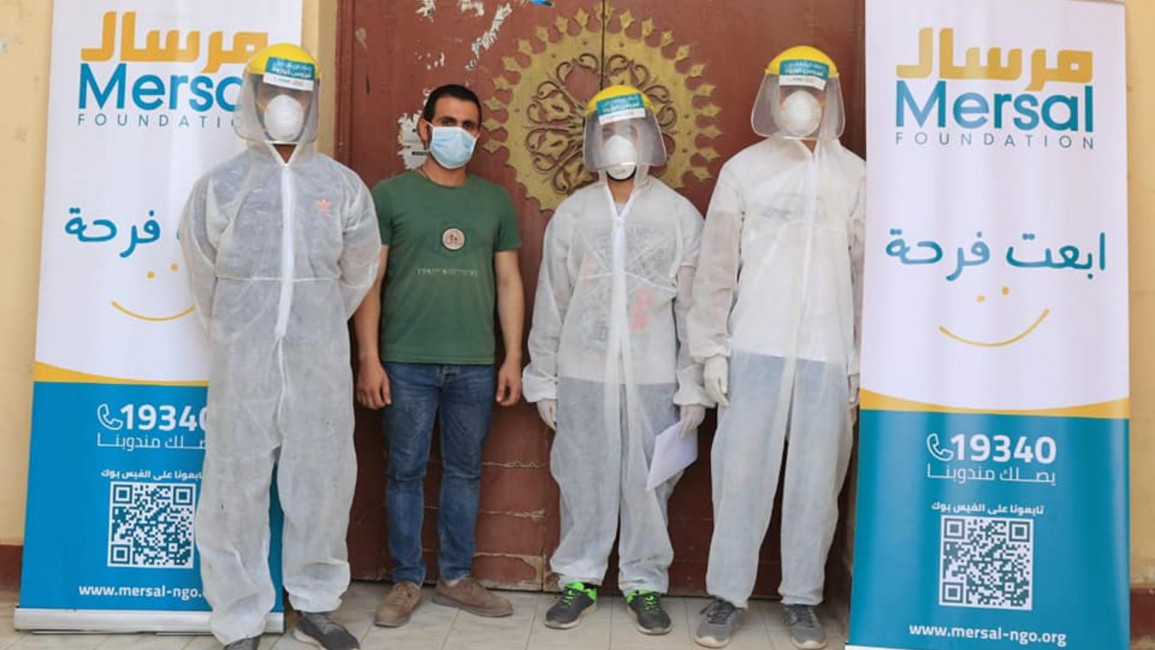
How Egypt is using charity to paper over its coronavirus failures
For normal Egyptians, unable to afford private healthcare, if you catch Covid-19 and require hospitalisation, it's a death sentence.
The virus has become associated with social stigma, and survivors, families of the deceased and medical staff have been subject to attacks, incited and compounded by the Sisi regime's endeavour to keep the true extent of the epidemic behind a veil of secrecy.
It's precisely these circumstances that make Heba Rashed's work truly remarkable. Rashed is the founder and CEO of Mersal, a charity she began five years ago in her apartment to focus on Egypt's major inequalities in healthcare.
After a tough start, Mersal now has four offices in Cairo and one in Alexandria, employing over 200 staff. The 24-hour hotline they operate has become a lifeline since the Covid-19 pandemic hit.
Relying solely on charitable donations, Mersal provides poor people with private healthcare that it contracts and pays for using donor funds.
Only those who understand the sheer inaccessibility of private healthcare to most Egyptians might understand the veritable miracles that Heba works. Within the context of Covid-19, Heba and her employees are saving perhaps hundreds of lives per day.
 |
Charity in Egypt has a function that is key to the operation of the kleptocracy |  |
Mersal also provides much-needed information on Covid-19, defying and working against a regime that violently and often destructively obfuscates potentially life-saving information. In Egypt, providing the truth about Covid-19 - or indeed any other occurrence the regime want to cover up - can be extremely dangerous.
We've seen the mass persecution of doctors and healthcare workers who have complained about the regime's response to the epidemic, so it might seem curious that Mersal has been left alone.
Given they highlight the inadequacies and mendacity of the regime, you'd think they'd be prime targets for persecution, but this misses a fundamental aspect of the sociopolitical function of "charity" under not just the Sisi regime, but the kleptocratic system that arose under the regime of Anwar Sadat and was solidified by Mubarak.
Accompanying Mubarak's ravenous looting of the state was the destruction of much of Egypt's once strong social services.
Twitter Post
|
In order to make up for the dwindling and often non-existent social provisions under Mubarak, other groups, but most significantly the Muslim Brotherhood, picked up the slack, creating a vast network of charity organisations that undertook functions usually reserved for the state.
This created a dilemma for Mubarak, who identified the Brotherhood as the main political enemy of his regime, but also realised that their charitable function had become a "shadow" welfare state. Without it, Mubarak reasoned, social unrest could grow and Egypt's population could fall behind in terms of health and welfare.
Read more: Egypt to sell AstraZeneca vaccine to citizens 'who can afford it'
Mubarak thus allowed the Brotherhood to operate these charities, which included everything from hospitals and schools to street cleaning services and garbage collection. However, if ever any of the Brotherhood enterprises was deemed to cross the line, Mubarak would quickly shut it down and arrest those involved.
After coming to power, Sisi, in keeping with his totalitarian slide, permanently ended this "shadow" welfare system, completely eradicating the Brotherhood and its possessions, and once again leaving Egyptians to struggle without adequate healthcare and social services.
This could certainly be one reason why Mersal, for now, has been able to function without state persecution.
Though it takes nothing anything away from of Mersal's astounding work, charity in Egypt has a function that is key to the operation of the kleptocracy. Indeed, in terms of the prevailing global economic order, using charity in this manner is nothing new.
It's why so many western liberal democracies have so shamefully come to rely on foodbanks, often run by private charities, to feed those who fall below the poverty line.
 |
Sisi, in keeping with his totalitarian slide, permanently ended this 'shadow' welfare system |  |
In the UK, when David Cameron came to power he championed a charitable and voluntary project called the "Big Society", which was really about a need to cajole charities into providing aid to the victims of the deep cuts his government made.
In this sense, it's notable that Mubarak's "economic reforms", which had the decimation of public services at their core, were fully overseen by the IMF and embraced by the West, while Sisi's own poverty-making wave of austerian "economic reforms" were part of an IMF loan package.
In Egypt, it's precisely the same ideology as austerian neoliberalism, but carried out within the context of an authoritarian kleptocracy.
In fact, Sisi himself came to power with his very own notion of a "Big Society", namely the Tahya Misr fund (Long Live Egypt fund).
 |
In terms of the prevailing global economic order, using charity in this manner is nothing new |  |
This was a plan to announce immediately that government spending on infrastructure and provisions for the poor would be kept to a minimum, while a mixture of government-friendly charities and his elite business allies would be encouraged to provide services to and donate private funds for projects that should be covered by the state.
It is essentially a racket, allowing kleptocrats to parasite off the poor.
Again, Mersal's work should be celebrated, but, as with many charities, the need for it has arisen out of others' mismanagement, namely the massive, fatal, and terminal inequalities in healthcare that Egyptians face.
In this sense, in Mersal and its endeavour, we see both the best and worst of Egypt. The best in Heba Rashed, who tirelessly and bravely saves lives that regime would condemn to death, and the worst in the very system that means that Heba has to devote her young life to this grim task.
Sam Hamad is a writer and History Phd candidate at the University of Glasgow focusing on totalitarian ideologies.
Join the conversation @The_NewArab
Have questions or comments? Email us at: editorial-english@alaraby.co.uk.
Opinions expressed in this article remain those of the author and do not necessarily represent those of The New Arab, its editorial board or staff.




